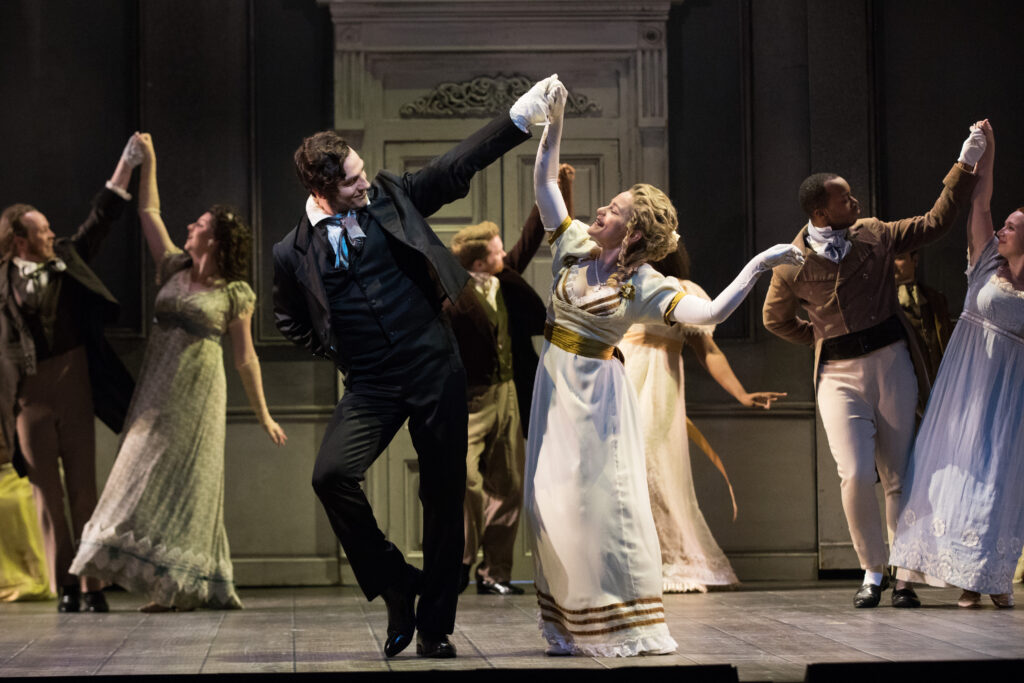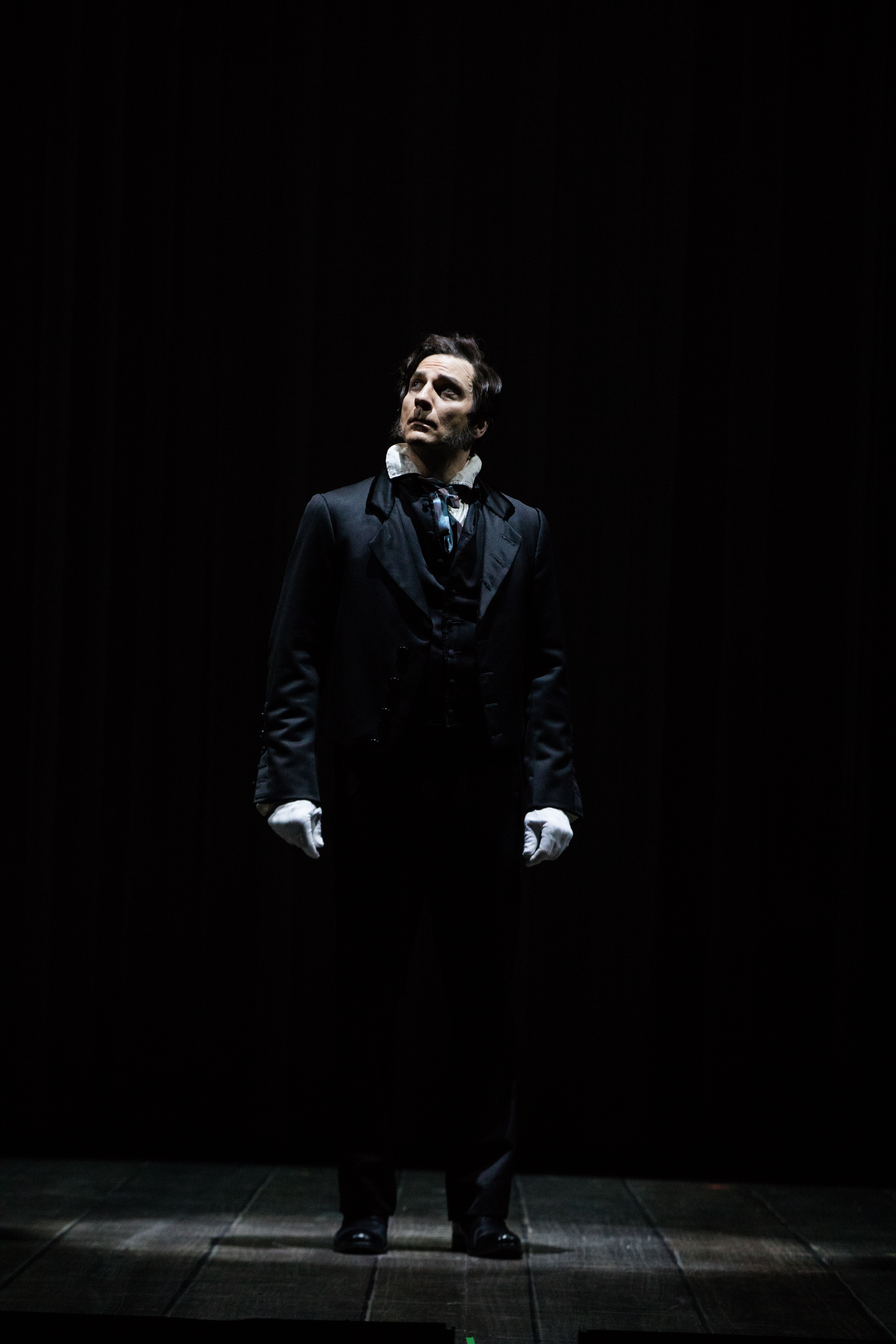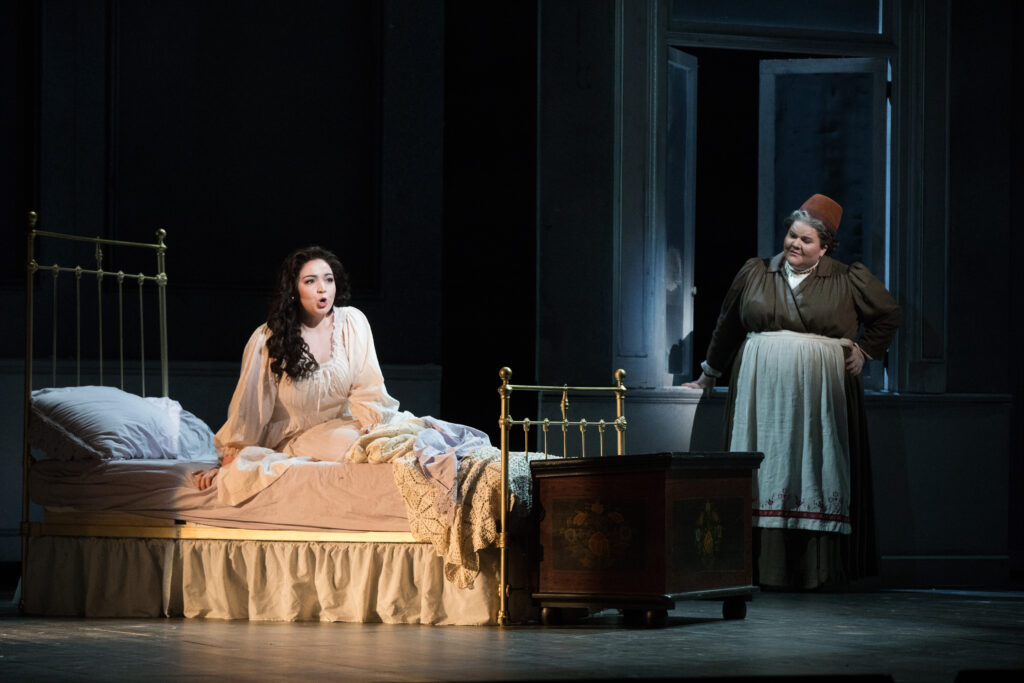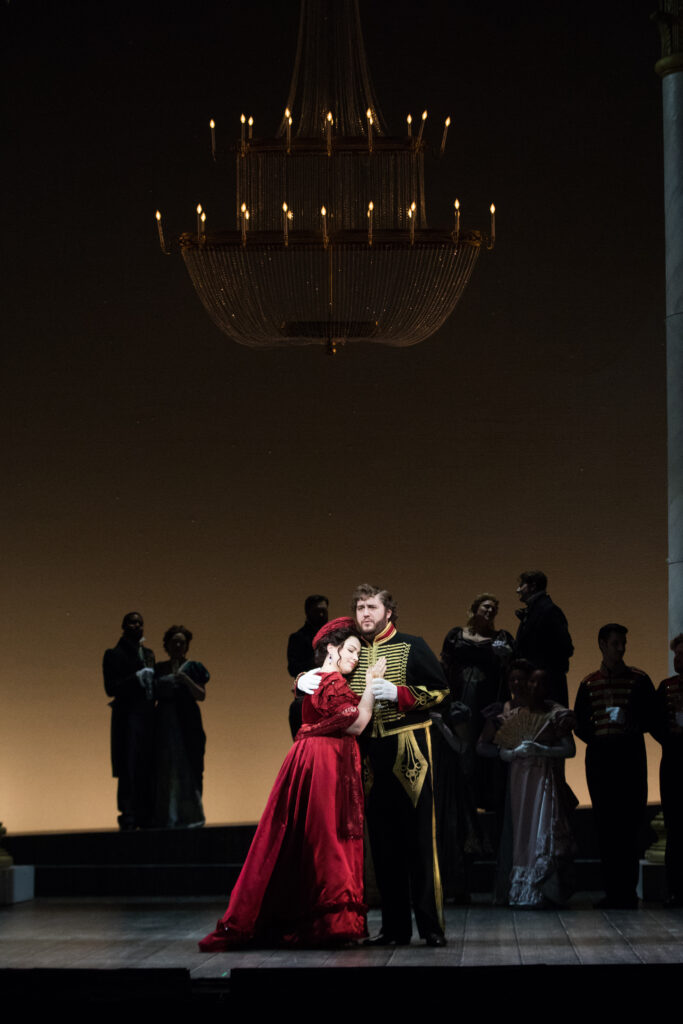Absent in our city since its Atlanta Opera staging at the Civic Center in 2004, Tchaikovsky’s Eugene Onegin returned to Atlanta this past Saturday, this time on the stage of the Cobb Energy Centre, and was enthusiastically received. The new production, a joined effort shared by the Atlanta Opera, Lyric Opera of Kansas City, Hawaii Opera Theatre, Seattle Opera, and Michigan Opera Theatre, is comprised of period appropriate sets and costumes which set the right atmosphere for Tchaikovsky’s masterpiece to properly unfold. Perhaps unsatisfied by this fact, production director Tomer Zvulun adds innovative touches that occasionally rock the proceedings off kilter.

This is not to say that things take an abrupt turn towards conceptualization (for the most part the relationships between the characters were handled with respect to the printed score,) but the inclusion of mute actors representing the aged Onegin and Tatyana recalling each episode through their own point of view proved wholly unnecessary, as the concept of regret is masterfully underlined by Tchaikovsky throughout his score. “Let well alone,” it seems to cry out. Thankfully, like most things of this nature, the extraneous elements were easily ignored if one is familiar with the work at hand. One specific blunder however, that of presenting Prince Gremin as a young man, diminished the tragedy of Tatyana and did much to undermine the impact of the story in a considerable way. For his part, maestro Ari Pelto, taking over the conducting assignment left vacant by maestro Stephen Lord (per doctor’s orders) made a promising Atlanta Opera debut with these performances. Despite an initial tendency towards erratic tempi, his baton drew out the most elegant lines out of the Atlanta Opera Orchestra heard in at least a decade. He also provided sensitive support to his soloists, particularly those facing extraordinary circumstances.
At the onset of the evening, following the various announcements of next season’s repertoire and the customary buttering up of the big shot donors, the audience was hit with a thunderbolt: the scheduled Lensky, William Burden, would be unable to go on. In addition, there was a twist! Instead of fully relinquishing the part to the understudy, Mr. Burden, it was declared, had chosen to act out his stage business and lip-sync for his life for two hours. All the while, tenor Justin Stolz, a resident artist and the evening’s scheduled Monsieur Triquet, would sing his part from the wings. A palpable murmur waved through the titillated audience while your friends at newoutpost struggled to recall a past instance where this fabled convention of operatic lore had played out in our city. A music stand with a small light was placed on the right side of the stage, and it served as ground zero headquarters for the heavy task trust upon the shoulders of Mr. Stolz. His first hurdle, albeit a warm up of sorts, took place with the offstage reaper heralding the peasants in act one. The unaccompanied “Bolyat moi skori nozhen’ ki so pokhodushki” gave a definitive account of what would be heard in the more difficult pages to follow. His is a well-produced lyric tenor, steady in emission and proportionate in color from top to bottom. While the voice is not of dramatic dimension and lacks a certain brightness or squillo at the top, the tone is masculine and self-assured, the core of his sound held together by an attractive shade of bronze which attains pale silver undertones as it escalates the scale. As Mr. Stolz navigated through Lensky’s introductory phrases and short quartet, he employed the whole of his resources to deliver a solid take on the testing “Ya lyublyu vas, ya lyubluy vas, Olga,” managing the rising tessitura with noteworthy security. Act two featured an entertaining and robust rendering of Monsieur Trinquet’s snobby ditty, and successfully managed the switch to the now brooding and irate Lensky as his tenor lead the way through the rising concertato that brings the scene to a close. Despite the less than ideal circumstances, Mr. Stolz cleverly managed his pacing for his big scena in the second tableau, and he achieved the long rising phrases and endless legato of the celebrated “Kuda, kuda, kuda vi udalilis” with professional aplomb.

At the final curtain, the ovations were led by his ailing colleague (who to his credit never missed a syllable of his pantomime,) and deservedly so. Mr. Stolz’ feat that night was unquestionable, but while we joined the others in appreciation of his fait accompli, we did so with a slight air of disappointment which we hope the following will explain. To date, we have seen Mr. Stolz in four mainstage roles, two of which are showy enough (Steuermann in Der Fliegende Hollander and Alfredo in Verdi’s La Traviata) to warrant greater scrutiny and deny him the coddling reserved for inexperienced artists. In both, Mr. Stolz proved himself a fine singer, a developing talent with the makings of an important career, but what he seemed to lack in those performances was an artistic compass, and at times, true expression through singing. Our ear does not detect his vocal point of view, either of the character he’s portraying or if he’s moved by the situations they’re facing. Our recollection of his previous work: impressive, but generalized and slightly removed holds true still, even as the hyper romantic, Byronic Lensky. Only once, during his renouncement of Onegin during the ball scene, did a spark of legitimate verve infect his declamation. Otherwise, while his solid and business-like performances will cement his position with the Atlanta Opera company as an asset, he will remain a singer capable of securing a good evening, which will almost surely deny a great one. We desperately wish for his future work to turn our statement on its head.
In the title role, baritone David Adam Moore has the physique du role (Barihunks calendar 2012 and 2013 plus countless productions where shirts are seemingly not accounted for in the costume budget) and aloof stage presence to deliver a definitive performance of Eugene Onegin, and for the first two acts he comes relatively close to doing just that. When the third act arrives, however, the necessity to sing the more musically complex pages of the role hold back his efforts to an almost dead stop. When comparing his current vocal state to the singer we heard back in September 2016 as Raymond Shaw in Puts’ The Manchurian Candidate, a definite decline has already set in less than three years, and it is quite a shame. Even back then, despite his impressive performance, we worried about a certain inflexibility in method that often leads to vocal fatigue, which may have played out during our very eyes this past weekend.

The role of Eugene Onegin is curiously back loaded, and save for his sermon to Tatyana, his musical responsibilities are comprised of ensembles and proclamatory passages for the first two thirds of the evening. When the final act hits, Onegins are confronted with a very dramatic outburst which mirror Tatyana’s opening phrases in the letter scene, and a final 13 minute duet which demands the baritone to project loud and soft passages, declamatory singing, the sustainment of long lines, and all the accompanying colors that will bring that sort of vocalism to life. As heard on opening night, Mr. Moore came woefully short of navigating the requirements, and throughout his performance, Tchaikovsky’s score began to call out a loss of girth in his overall instrument. Mr. Moore also experienced considerable trouble bringing the core of the voice up the range, and at times his upper tessitura seemed held together by fumes. Still a young man, Mr. Moore can still successfully masquerade some of these flaws and figuratively survive the night, but we hope those close to him recognize that the damage is significant and will advise him to address the needs of the more important muscles in the body of a singer of the lyric stage. He has a responsibility both to his art and his talent to do just that.
As Tatyana, soprano Raquel Gonzalez deserved the evening’s top honors. The young soprano (we do not believe she is yet 30) is new to us, and casual cyber stalking has yielded an impressive list of testing roles in so short a career. Your friends at newoutpost have already made it a point to place stickers around her name and will continue to be on the lookout for future performances. Her soprano is a full, round lyric instrument, of a distinctive bright yet lachrymose color. When pressed for volume, she was capable of filling the significant Cobb Energy Centre auditorium, and was able to cut through the largest ensemble with ease. If it continues to develop with extreme care, a baby spinto is hinted in her throat. As heard last weekend, the instrument is responsive to the singer’s needs from the top to the bottom of the scale, and it pulses out of its source with a genuine excitement: she wants to be up there! A creative artist, Ms. Gonzalez used a variety of attack (soft, loud, broad, edge, subito, etc,) and the hint of acidity in her tone to project her sentiment in a manner surprising of her age. An occasional bout of faulty intonation here and there was inconsequential, specially the way she ran the gamut of her instrument to give a poignant reading of the opera’s famous letter scene. The matter of her stage deportment presented a small caveat. Short in stature, she will have to continue working with clever costume designers to maintain an illusion of grandeur. Moreover, her body movement often over-emphasized the emotion projected by her expressive face. We hope that with time and experience, she will arrive at a happy medium.

The smaller roles were expertly fulfilled by four extraordinary artists which we would be hard pressed not to mention, all making their debuts with the Atlanta Opera in this performance. We heard mezzo-soprano Megan Marino about 5 years ago when she was part of the Des Moines Metro Opera young artist program. Back then we recognized a flexible lyric mezzo-soprano of much promise. Now, making her debut as Olga, we are thrilled to witness her potential fulfilled. While the color of her mezzo remains gossamer and even, she was gained an authority over it not previously heard. Her Olga is charming and carefree, without a hint of flippancy, and may rank as one of the most convincing impersonations of the role in recent memory. The presence of Meredith Arwady as Filipyevna was a true instance of luxury casting. The young contralto is the real deal, a booming sound which impressively favored the lower tessitura. The wool of her instrument tended to unravel a bit as she explored the upper range, but this just added to her fruity interpretation of old nurse. It would be quite intriguing to hear her in the repertoire intended for her fach, such as the bel canto trouser parts and the Verdi contralto roles (usually sung by dramatic mezzos nowadays). She made a great contrast with the alert and characterful lyric soprano of Margaret Gawrysiak in the role of Madame Larina. Turkish bass Onay Kose made Atlanta audiences sit up immediately during his brief appearance as Prince Gremin. His booming sound slid up and down his range with slick fluidity, and his aria “Lyubvi vsye vozrasti pokorni” brought down the house. His placement is secure throughout the staff, and if he merely waits for the years to mellow the sound at the bottom of his register, he will be a god.
You can still catch the remaining three performances of The Atlanta Opera’s new production of Tchaikovsky’s Eugene Onegin. For tickets or more information, please visit the company’s website at www.atlantaopera.org